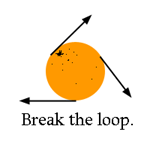

 | Tangentium |
January '04: Menu
All material on this site remains © the original authors: please see our submission guidelines for more information. If no author is shown material is © Drew Whitworth. For any reproduction beyond fair dealing, permission must be sought: e-mail drew@comp.leeds.ac.uk. ISSN number: 1746-4757 |
Language, Knowledge and ExclusionDrew WhitworthPage 1 ¦ Page 2 ¦ Printer-friendly version The aim of this brief supplementary essay is to introduce the reader to some ways whereby power and exclusion can be bound up with the use (and abuse) of language and information. The theoretical elements of this paper have been kept deliberately simple, and subordinate to the use of examples to illustrate the points. As well as complementing this month's other essays, this paper also serves as a link between these topics and the subject of the next issue of Tangentium on "Cyberspace and the Noösphere". Many commentators bemoan the development of a "digital divide" without always thinking through why this matters. Is it a lack of access to the technology itself which is problematic, or is the technology merely a portal to more important opportunities? If the first were the case, then universal "access" to IT could be achieved rather simply, in the way the populace now has near-universal access to television; make the technology very cheap, and ensure people are engaging with it in a purely passive, commercialised manner. IT is not at that low level of interaction (yet). We assume that access to IT is desirable not because the technology is desirable in its own right, but rather, because of what it enables us to do - access, manipulate, analyse and store informational resources. When talking about "exclusion" it is important to be aware of what victims are being excluded from. Usually, the answer is that they are being excluded from some form of resource. Resources can be material, such as food, land or oil: most of all, money, which usually serves as a proxy resource for all others. But many of the resources which we draw on to live our lives are not so clearly material. Is "healthcare" a purely material resource, for instance? Even more ambiguously, what of "culture"? Or "knowledge"? In fact, resources are more likely to be at least partly social or informational as material. Although this observation is not directly relevant to the rest of this essay, it should be borne in mind. It helps suggest why exclusionary practices based on language and knowledge can be so divisive. Social and informational resources are just as valuable as material ones, and being excluded from drawing on them can damage lives, or at best make them less fulfilling. "Community" is a contemporary buzzword, but also a rather nebulous concept (see this month's key terms). Even when the idea of a social network is more formalised, such as in "the organisation", describing exactly where an organisation begins and ends is not always easy. Nevertheless such boundaries are often drawn, implicitly or explicitly, and their exact location matters (particularly if one is on the "wrong side"). If one is "excluded" from a given practice, institution, group, organisation or community, this usually means that one is prevented from (legally) accessing resources which are in some fashion reserved for those who are "included". Although boundaries between the "included" and "excluded" can be very subtle and permeable, they can often be discerned. Ideas of "us" necessarily include the complement, "not-us", and it is often the "not-us" which is based on firmer criteria than the "us". Exclusions by skin colour, gender, sexuality and religion are perhaps the most obvious affirmations of power, if this term is defined as the ability to determine the grounds for exclusion - and to enforce them. But throughout history there have been more complex bases for exclusion based on criteria such as occupation, education, (sub)culture, even ritual. That which was to be excluded was considered "polluting", an anomaly to be shut out or removed (see Mary Douglas (1966), Purity and Danger: An Analysis of Concepts of Pollution and Taboo, London, Routledge & Kegan Paul). Yet despite these many and varied ways in which "not-us" can be defined, the use of brute force to ensure exclusion is comparatively rare. Far more frequent are subtle exclusions based around the following:
The second page of this essay goes into more detail about each of these. | |